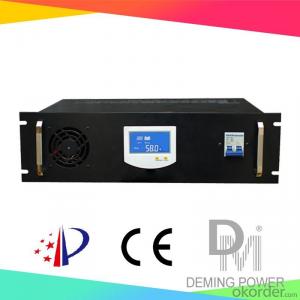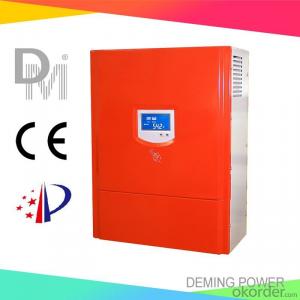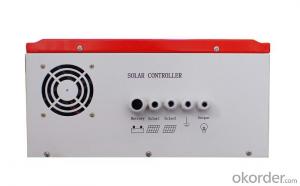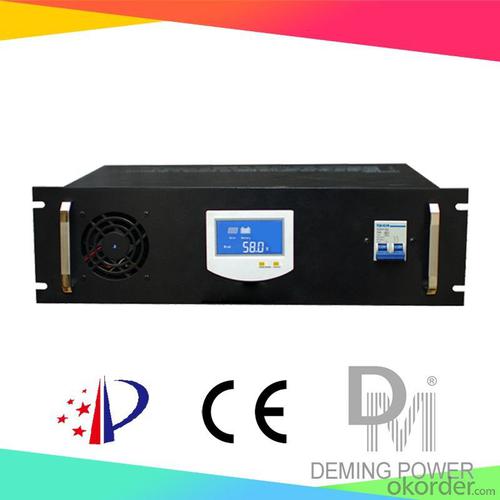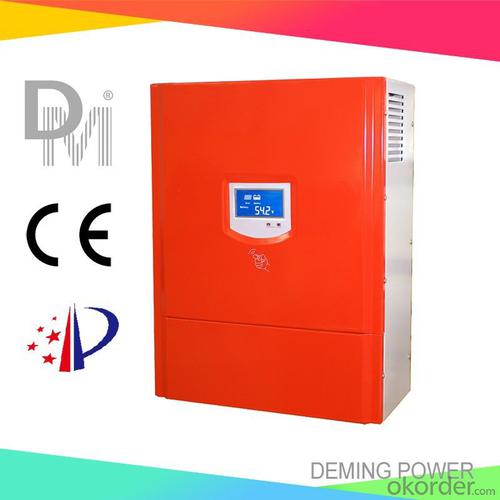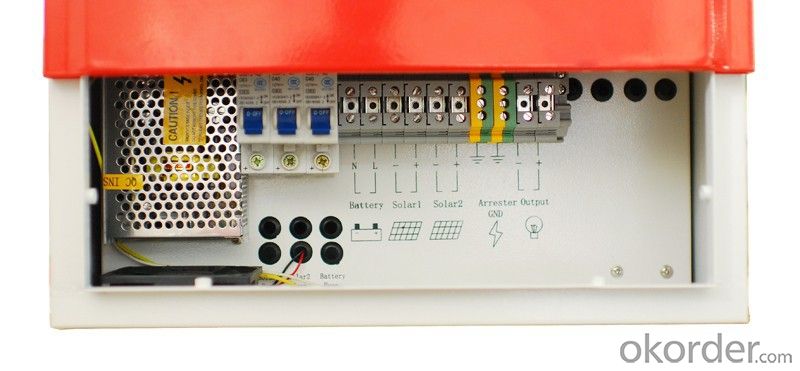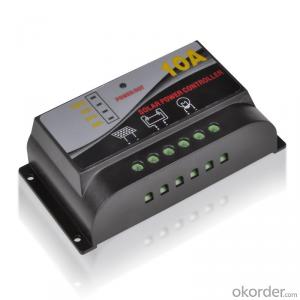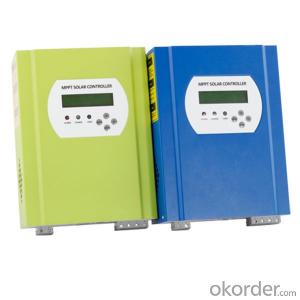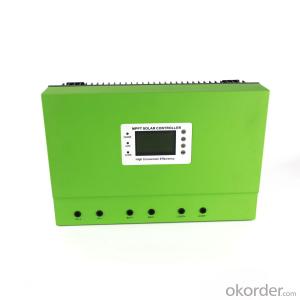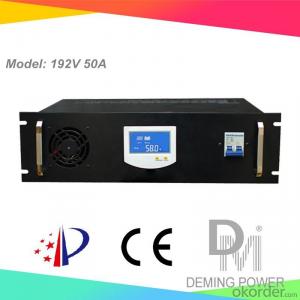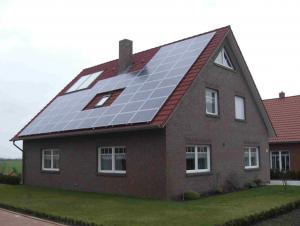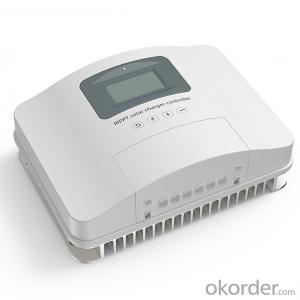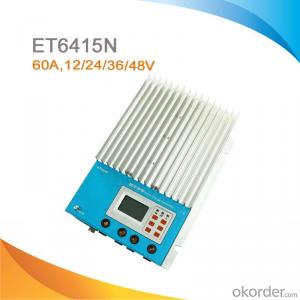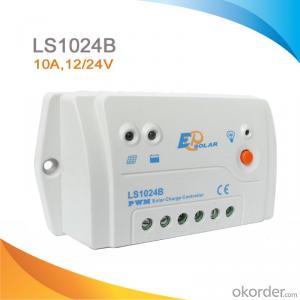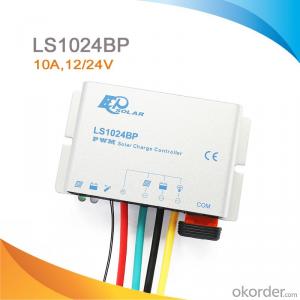Best Solar Charge Controllers:220V 30A/50A/60A/80A for Off-Grid Solar Power Systems with RS485
- Loading Port:
- Qingdao
- Payment Terms:
- TT OR LC
- Min Order Qty:
- 1 PCS
- Supply Capability:
- 1000 PCS/month
OKorder Service Pledge
OKorder Financial Service
You Might Also Like
Properties of the solar charge controller
1. Design for off-grid solar power system.
2. Applicable to different kinds of batteries.
3. Modular design with simple structure and easy maintenance.
4. Automatic power control function.
5. LCD display: Solar panel current, solar panel voltage, solar panel power, battery group voltage, charge current.
6. Perfect protection function: Solar reverse charge protection, Solar reverse connection protection, Battery reverse connection protection, Battery overcharge protection, Battery over current protection etc ,thus the system has higher reliability.
Technical parameters of the solar charge controller
Model | 220V30A | 220V50A | 220V60A | 220V80A |
Battery group rated voltage | 220Vdc | 220Vdc | 220Vdc | 220Vdc |
PV open circuit voltage | 500V | 500V | 500V | 500V |
PV Rated current | 30A | 50A | 60A | 80A |
PV Max. power | 6600Wp | 11000Wp | 13200Wp | 17600Wp |
Input PV module road number | 1 | 1 | 1 | 1 |
Function | Auto stop charge, auto recharge voltage; Protection: connecting contrary, over current, short circuit, over heat etc. | |||
Display mode | LCD | |||
Display content | solar panel voltage, solar panel current, solar panel power, battery voltage, charge current | |||
Floating Charge Voltage (adjustable) | 248Vdc | 248Vdc | 248Vdc | 248Vdc |
Stop charge voltage | 260Vdc±1% | 260Vdc±1% | 260Vdc±1% | 260Vdc±1% |
Recharge voltage | 243Vdc±1% | 243Vdc±1% | 243Vdc±1% | 243Vdc±1% |
Voltage drop between PV and battery | 1.5V | |||
Max itself power consumption | 100mA-150mA | |||
Work environment temperature | -30-60°C | |||
Relative humidity | <90% No condensation | |||
Applicable altitude | <3000m The rated power should be reduced when it is higher than 2000m | |||
Noise (1m) | <40dB | |||
Degree of protection | IP20(Indoor) | |||
Cooling method | Forced air cooling | |||
*Communication interface (optional) | RS485/USB/GPRS/Ethernet | |||
*Temperature compensation(optional) | -4mv/°C/2V,-35°C~+80°C,Accuracy:±1°C | |||
Product size (mm) | 520*430*200 | |||
Weight | 12Kg | |||
*Above parameter only for reference. Could be custom made to user specifications.
- Q: Can a solar controller be used in off-grid applications?
- Yes, a solar controller can definitely be used in off-grid applications. In fact, it is an essential component of off-grid solar systems as it regulates the charging and discharging of batteries, ensuring optimal performance and extending battery life. The solar controller helps to manage the flow of electricity between the solar panels, batteries, and loads, ensuring that the batteries are charged efficiently and preventing overcharging or deep discharging.
- Q: Can a solar controller be used with a solar-powered transportation system?
- Yes, a solar controller can be used with a solar-powered transportation system. A solar controller is designed to regulate the voltage and current from the solar panels, ensuring efficient charging and protection of the batteries. In a solar-powered transportation system, the solar controller plays a crucial role in managing the energy flow from the solar panels to power the vehicle's motor or charge its batteries.
- Q: Can a solar controller be used with a solar-powered restaurant or cafe?
- Yes, a solar controller can definitely be used with a solar-powered restaurant or cafe. A solar controller helps regulate and optimize the charging and discharging of batteries in a solar power system. It ensures that the solar panels are efficiently converting sunlight into electricity and that the batteries are properly charged and protected. This is crucial for a solar-powered restaurant or cafe as it allows for a reliable and sustainable energy source to power various electrical appliances and equipment, reducing dependence on the grid and minimizing operating costs.
- Q: How does a solar controller handle load control and diversion charging?
- A solar controller handles load control and diversion charging through its built-in features and capabilities. Load control refers to the management of power distribution to various loads or appliances connected to the solar system. Diversion charging, on the other hand, involves the redirection of excess energy produced by the solar panels to charge additional devices or batteries. To handle load control, a solar controller typically offers multiple load terminals or outputs. These terminals can be connected to different electrical loads, such as lights, fans, or other appliances, allowing the controller to control the power flow and regulate the energy consumption of each load. This ensures that the available solar power is efficiently utilized and prevents overloading of the system. Diversion charging is achieved by connecting a diversion load, such as a dump load or a secondary battery bank, to the solar controller. When the solar panels generate more energy than the connected loads require, the controller diverts the excess power to the diversion load. This prevents the batteries from overcharging and maximizes the utilization of the solar energy. Solar controllers often employ sophisticated algorithms and monitoring systems to determine when to activate load control or diversion charging. These algorithms take into account various factors, such as battery voltage, solar panel output, and load requirements, to make intelligent decisions regarding power distribution and diversion. Some controllers even feature advanced MPPT (Maximum Power Point Tracking) technology, which optimizes the solar panel output and ensures efficient power conversion. In summary, a solar controller handles load control and diversion charging by providing multiple load terminals for power distribution and diverting excess energy to a diversion load. It utilizes algorithms and monitoring systems to make intelligent decisions and optimize the utilization of solar energy.
- Q: What is the role of a solar controller in maintaining battery health and longevity?
- Maintaining battery health and longevity is of utmost importance, with the solar controller playing a crucial role in this regard. Commonly referred to as a charge controller, the solar controller regulates the flow of charge into the battery from the solar panels. One of the primary responsibilities of the solar controller is to prevent the battery from being overcharged. Overcharging can result in the release of gases and electrolyte loss, significantly shortening the battery's lifespan. To avoid this, the solar controller diligently monitors the battery's charge level and adjusts the charging current accordingly, ensuring that overcharging does not occur. Moreover, the solar controller also safeguards the battery against deep discharging. Deep discharges can inflict permanent damage on the battery, reducing its capacity and overall life expectancy. By constantly monitoring the battery's voltage, the controller disconnects the load when the voltage drops to a predetermined level, preventing further discharge. In addition to preventing overcharging and deep discharging, the solar controller provides protection against various potential issues that can harm the battery. It regulates the charging current to prevent excessive heat accumulation, which can be detrimental to the battery. Furthermore, it offers protection against reverse current flow during periods of low solar panel power generation or during nighttime. By efficiently managing the charging process, the solar controller maximizes the battery's lifespan and overall health. It ensures that the battery is charged optimally and shielded from detrimental conditions that can cause premature aging or failure. Hence, investing in a top-quality solar controller is imperative for maintaining the health and longevity of batteries in solar-powered systems.
- Q: Can a solar controller be used with solar-powered charging stations?
- Yes, a solar controller can be used with solar-powered charging stations. A solar controller helps regulate the flow of electricity from the solar panels to the charging stations, ensuring efficient charging and preventing overcharging or damage to the battery. It also helps optimize the energy harvested from the solar panels, increasing the overall efficiency of the charging stations.
- Q: How do I protect a solar controller from electromagnetic interference?
- To protect a solar controller from electromagnetic interference, you can take a few measures. Firstly, make sure the controller is installed in a location away from other electronic devices that emit electromagnetic radiation. This will minimize the chances of interference. Additionally, using shielded cables and grounding the system properly can help reduce electromagnetic interference. Lastly, you may consider using ferrite beads or filters to suppress any potential interference.
- Q: How does a solar controller prevent overloading of batteries?
- A solar controller prevents overloading of batteries by regulating the flow of electricity from the solar panels to the batteries. It monitors the battery voltage and prevents it from exceeding a certain threshold by disconnecting the charging source when the batteries are fully charged. This ensures that the batteries are not overcharged and damaged, maximizing their lifespan.
- Q: How does a solar controller handle temperature compensation for battery charging?
- A solar controller handles temperature compensation for battery charging by monitoring the temperature of the battery and adjusting the charging voltage accordingly. As the temperature increases, the controller reduces the charging voltage to prevent overcharging and damage to the battery. Conversely, as the temperature decreases, the controller increases the charging voltage to compensate for the reduced battery capacity in colder conditions. This temperature compensation feature ensures optimal charging performance and extends the lifespan of the battery.
- Q: Can a solar controller be used with solar panels of different manufacturers?
- Indeed, solar panels from various manufacturers can generally be paired with a solar controller. These controllers are specifically designed to oversee the battery charging process using solar panels, and they usually have broad compatibility with different brands and models of panels. Nevertheless, it is crucial to verify that the solar controller aligns with the voltage and current ratings of the solar panels to prevent any potential harm or reduced efficiency. It is highly advisable to refer to the manufacturer's specifications and guidelines for assurance of compatibility and optimal functioning.
Send your message to us
Best Solar Charge Controllers:220V 30A/50A/60A/80A for Off-Grid Solar Power Systems with RS485
- Loading Port:
- Qingdao
- Payment Terms:
- TT OR LC
- Min Order Qty:
- 1 PCS
- Supply Capability:
- 1000 PCS/month
OKorder Service Pledge
OKorder Financial Service
Similar products
Hot products
Hot Searches
Related keywords
